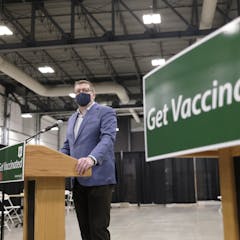
Articles on Health equity
Displaying 41 - 60 of 70 articles

When the UK’s red list is considered at a more granular level, the difficulties become immediately apparent.

Medical innovations paired with innovative programs to get them to Black, Indigenous and Hispanic Americans can help close the health inequality gap.

Green spaces can be part of the plan to ‘build back better’ after COVID-19. But city officials and policy-makers must address systemic racism for urban green spaces to benefit public health.

The mental health crisis occurring in tandem with COVID-19 has stressed resources and stretched service waitlists into years. There is an urgent need for prevention strategies, not just treatment.

Many researchers may lack resources to guide them in conducting research that is equitable, inclusive and respectful of diverse Indigenous knowledge, ethics, practice and research sovereignty.

One important metric by which we can measure the success of our public health system: Ensuring everyone has access to immunization in their community.

Fair global agreements, home-grown vaccines and sharing extra doses with poorer nations are all needed if we’re to ever emerge from this pandemic.

Expanding access to medical assistance in dying (MAID) to those not terminally ill puts vulnerable people at risk of feeling pressured into MAID, and doctors at risk of being forced to facilitate it.

One of the factors that has made COVID-19 so catastrophic in long-term care homes was lack of paid sick leave for low-wage workers.

So far, the only COVID-19 vaccines authorized for use need to be kept frozen. But there are many places in the world that can’t support a cold supply chain.

A private market should have no place in the rollout of a COVID vaccine.

In Brazil, black COVID-19 patients are dying at higher rates than white patients. Worse housing quality, working conditions and health care help to explain the pandemic’s racially disparate toll.

While African Americans account for about 14% of the US population, they have accounted for about 60% of deaths from the virus. Several physicians offer an idea they think could help.

When care is equity-oriented, patients report fewer depression and trauma symptoms, less chronic pain and improved quality of life.

A remote medicine program in Saskatchewan allows acutely ill children and pregnant women to be treated by specialist doctors, without leaving their communities.

Recent findings say that sitting around is a ‘first world’ problem. In reality, it’s a bit more complicated than that.

Genome sequencing is transforming the way we diagnose disease. But lack of diversity in genomic data means only some Canadians will benefit from this revolutionary technology.

A cure for many tropical diseases was discovered 30 years ago this month. The drug is donated by its manufacturer. Why are we still dealing with neglected tropical diseases?

Parents need support from early childhood educators to build capacity to claim for NDIS services.

It seems that vulnerability is a cost of privilege, and resilience comes as a result of adversity.

